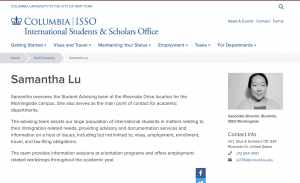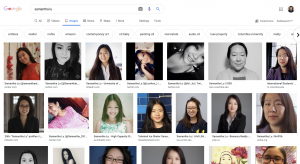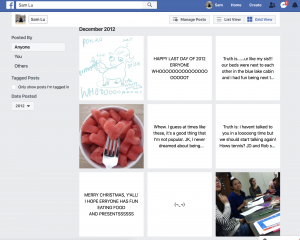Difference between revisions of "Tianshuo Yan"
| Line 13: | Line 13: | ||
While I search for "Tianshuo Yan" in Google, the first term is the first blog I wrote at medium.com, which is the first assignment of SI410. Along with the second blog, they are the whole things about me I could get access to in google. | While I search for "Tianshuo Yan" in Google, the first term is the first blog I wrote at medium.com, which is the first assignment of SI410. Along with the second blog, they are the whole things about me I could get access to in google. | ||
| − | ===Some thoughts about the different presentation of two engines== | + | ===Some thoughts about the different presentation of two engines=== |
Although as Floridi wrote, ICTs reduce the friction of information exchanges, there seems a extremely strong friction between China and the western countries. | Although as Floridi wrote, ICTs reduce the friction of information exchanges, there seems a extremely strong friction between China and the western countries. | ||
Revision as of 07:13, 19 February 2021
This is a template/
ICT constructed a brand-new world for people, everyone could have his own data identity in the infosphere. This allows us to let people see whatever we want them to see, which is part of the reason why our online identity is different from who we really are. On one hand, infosphere is nothing but another biosphere. To illustrate, running an online image is similar to what people do in everyday life. Every post to the internet is like choosing clothes to show up in the work space. People have to pay attention to what their messages along with the posts, just the same as choosing a good sentence to communicate with others. On the other hand, our life in the real world can be fully controlled by ourselves, whereas the information that shows up in the internet could also be limited by those who construct the platform for people.
Contents
Search Engines
Baidu
Baidu is a search engine that is most frequently used by Chinese people. After searching my name in Chinese, "鄢天烁", several hits showed up, mainly about competitions. The main theme of my childhood life is study. I spent most of my time up until high school studying math, piano, Calligraphy and pretty much anything that my parents think could make me versatile. With plenty of skills, it is not strange that I have attended a lot competitions like Olympics’ Math Competition, Olympics’ Chemistry Competition and etc. The competition organizers are willing to announce the results for fairness. This part of information is accurate, while they could hardly tell a story about who I am. This strongly supports my idea of online identities not equaling self-identities.
While I search for "Tianshuo Yan" in Google, the first term is the first blog I wrote at medium.com, which is the first assignment of SI410. Along with the second blog, they are the whole things about me I could get access to in google.
Some thoughts about the different presentation of two engines
Although as Floridi wrote, ICTs reduce the friction of information exchanges, there seems a extremely strong friction between China and the western countries.
Social Media Use
Past Usage
The bulk of my social media journey started in my freshman year of middle school, when I first created my QQ account way back in 2012. QQ is Chinese version of What's Up app with some twitter functions like posting your life. Everyone would have those years, posting meaningless sentenses, pretending to know the truth of the world, whereas these posts only make sense in their own mind. I was at this age when I started using QQ. I checked the posts history, the first post was like "I am the selected one". The most interesting part is not the content itself, but what I have done to it after I "graduated" from that period. I set the post to be private so that others can not see it. Like what I stated at the beginning, people in the infosphere have the right to set their own identity. My high school friends never know that I had such "silly" period and oddly aggressive declarations, hence this part of information about my real identity is lost, which contributes to the difference between the infosphere and real world.
Graduated from that "silly" period did not mean that I became normal in the common sense. When I was in high school, the teachers asked us to read news. Sometimes I would have a chance to know about the drawbacks of the Chinese Communist Party (CCP), I had a sort of shameless confidence that I am the only person who knows these points. With the willingness of showing off, I post these points to QQ. These posts did not have comments from others usually. Even the meaningless sentences I posted before had someone click "likes" whereas this is abnormal to have no comments. The delivering of information meets hurdles this time. These hurdles were caused by the algorithm of tech companies like Tencent. QQ is a tech product of Tencent. Usually, a giant company like Tencent is regulated by the country. As the leading party of China, CCP ought to stop the unreliable comments including what I posted before from being delivered to keep the country together. This leads to the lack of anti-CCP part of my information in others’ cognition. Though I am glad my comments were not shown to others, this was not pleasant for 16-year-old Yan. Shortly speaking, some organizations set information barriers so that the information in the public infosphere is exhibited in the way they wanted.
Present Usage
I haven't used QQ anymore since I came to collage. Instead, I became a user of Wechat, which is another Tencent product. Wechat basically has the same functions with QQ with much cleaner interface and it is more concentrated on the online communication system. I merely post my idea
I haven’t made a Facebook status in years. In fact, in recent months, I’ve deactivated or deleted a majority of my accounts, including my Instagram and Snapchat. I’ve thought a lot about how I spend my time, especially as graduation looms nearer and I’m forced to consider what post-graduation me will do with her time when she’s not working. One major reason was that the digital version of myself has little to no impact on my real-life self — the way I conceptualize it, digital me is merely a way to distract from the day to day. Time spent on Instagram’s endless scroll is just time I could have spent reading or doing something else that has more measurable returns than a time suck.
Quitting most social media has made me reevaluate who I spend my time with and why. If our only interaction was to send stone-faced selfies to one another on Snapchat, abandoning that platform altogether means that I no longer interact with that person, period. But if selfies were the only communication between us, was that acquaintanceship really anything meaningful? More specifically, if the only version of me someone interacts with is surface-level digital me, then where does real-life me come in?
Philosophy Behind Use Change
The more time I spend on social media, the more I feel that man's energy is limited. I need to consume most of time to keep my digital identity to act as I expected.I recalled two economic terminologies -- sunk cost and decreasing marginal utility theorem. Like I have stated, ICT have add another dimension to our world, making it possible to have another identity in a brand new world. This is like an open-world game,it encourages you to explore and construct another self-identity in this world. At first, I was amazed by the digital world, reading others' posts and writing my own ones will give me plenty of happiness. As I read the posts day by day, even though they are different stories, the happiness I could gain from reading and writing is slowly but definitely decreasing, which is what strictly decreasing marginal utility theorem stated. When I could not attain utility from constructing my digital identity, posting became a burden to me. However, people will not close down their digital selves at this time because of sunk cost, like what I was during my freshman year in the collage. I found it was boring whereas I did not stop posting because I thought I have posted for years and there is no way for me to stop. The final straw was the economy class where I studied about the definition of "sunk cost".
If I had to further explain why I started closing down my digital self, I'd probably say something more along the lines of what philosopher Luciano Floridi suggests about human self-understanding. He frames the past three revolutions as ultimately centered on human perception and argues that we're in the midst of a fourth revolution that actually emphasizes how informational human identities are (Floridi 96). Floridi also suggests that the current generation is possibly the last to experience a clear distinction between offline and online states.
Looking Forward
References
“Self-Understanding.” The Fourth Revolution: How the Infosphere Is Reshaping Human Reality, by Luciano Floridi, Oxford University Press, 2014.



